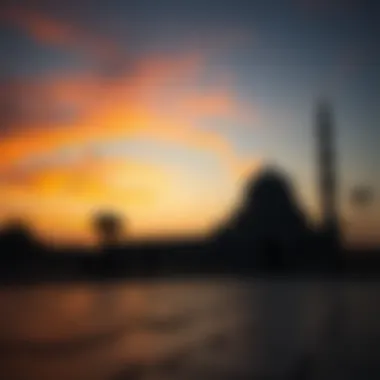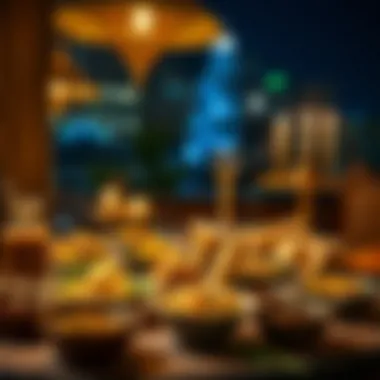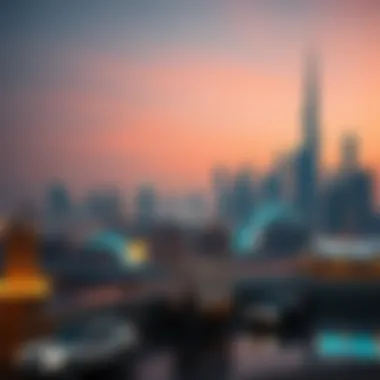Ramadan Timing in Dubai: A Guide for 2023


Intro
Ramadan in Dubai is more than a mere calendar event; it represents a profound transformation in the city's rhythm of life. For Muslims, this month is sacred and observance is richly infused with cultural significance. From the early morning hours of Suhoor to the evening's Iftar, the daily schedules reshape to accommodate fasting, reflection, and community gatherings.
In 2023, as the crescent moon rises to signal the start of this holy month, understanding its implications becomes essential for both residents and visitors. This article aims to dissect the intricate layers of Ramadan, focusing on the timings that dictate daily practices, the cultural connotations attached, and the significant shift in lifestyle during this period.
Consider, for instance, how prayer times intertwine with meal schedules; the MMC (Muslim Market Calendar) tightly dictates when the city comes alive with food and festivities. For expatriates and investors, being aware of these nuances can offer substantial insight, whether it be related to real estate trends or understanding local community dynamics.
Taking a broad view, Ramadan lays the foundation for interpersonal connections while revealing elements that influence various sectors like hospitality and real estate. This guide will explore these aspects in depth, aiming to furnish readers with an informed perspective on how the holy month impacts life in Dubai:
- The timing of prayers and meals, crucial for both spiritual and social activities.
- Lifestyle considerations, emphasizing the changes in neighborhood activities and services during Ramadan.
- A market analysis to understand the flow of economic activities and future projections in the context of this period.
As we uncover these elements, readers will gain insights on how to navigate through Dubai during Ramadan, recognizing both its challenges and its rich avenues for cultural interaction.
Preface to Ramadan
Ramadan holds a pivotal place in the lives of Muslims around the world, and it carries immense significance within the context of Dubai's vibrant cultural fabric. As the ninth month of the Islamic lunar calendar, Ramadan is observed with dedication and reverence, marking a period of fasting, reflection, and community. This holy month encourages spiritual growth and fosters a sense of solidarity among individuals, reminding them of their responsibilities to both themselves and others.
The Importance of Ramadan
At its core, the importance of Ramadan transcends mere abstention from food and drink. It serves as a time for spiritual enlightenment, encouraging introspection and the strengthening of faith. The act of fasting during Ramadan is designed to promote self-discipline, patience, and empathy for those less fortunate. In a bustling city like Dubai, the observance of Ramadan transforms not only the individual but also the collective experience of the entire community.
During this month, special emphasis is placed on prayer, reading the Quran, and conducting charitable acts. One notable aspect of Ramadan is the tarawih prayers, held nightly in mosques, where worshippers gather to express their devotion. Additionally, breaking the fast during iftar, the meal served at sunset, often becomes a communal affair. It is quite common in Dubai for families and friends to come together, sharing food and fellowship, reinforcing the bonds of unity and compassion.
Historical Context
Historically, Ramadan dates back to the time of the Quran's revelation to the Prophet Muhammad, making it a month of great importance in Islamic traditions. Each year, its timing shifts due to the lunar calendar, causing Ramadan to fall 10 to 12 days earlier annually, making it a diverse experience based on time and context.
In Dubai, the significance of Ramadan has evolved over time, blending tradition with modernity. In earlier times, fasting was a communal responsibility, deeply rooted in the desert tribes' culture and practices. This period became a time for families to gather, fostering a sense of belonging and community life that persists today.
Today, as Dubai epitomizes a global city, the essence of Ramadan acknowledges its roots while adapting to the cosmopolitan nature of its residents. Understanding this historical backdrop allows both locals and expatriates to better appreciate the cultural nuances surrounding Ramadan.
As we delve deeper into the specifics of Ramadan timing for 2023, it is essential to recognize how these practices are interwoven with Dubai's lifestyle. Stay tuned for insights on the unique ways this month unfolds in the city.
Ramadan Timing in Dubai for
Understanding the timing of Ramadan in Dubai is essential for both residents and visitors. Ramadan is not just about fasting; it’s also a time when daily routines shift dramatically. Prayer timings, meal schedules, and social gatherings all revolve around the sacred month. Knowing these timings can improve one’s experience and help in making connections with the vibrant community during this time.
Dates of Ramadan
In 2023, Ramadan is expected to commence on the evening of March 23, depending on the sighting of the moon. This date marks the beginning of a month-long period of fasting which concludes with Eid al-Fitr. The timing can vary slightly, so it's always good to keep an eye on announcements from local religious authorities.
Daily Prayer Timings
During Ramadan, prayer times hold even more significance. Each prayer offers an opportunity for reflection and spiritual connection. Below are the prayer times that Muslims observe daily throughout the month.
Fajr
Fajr, the pre-dawn prayer, occurs before the fast begins. In 2023, it will be around 4:45 AM. This moment marks the beginning of the day’s fasting. The serene atmosphere during this hour is unique, as people wake up early for spiritual nourishment. The reflective nature of Fajr serves as a peaceful way to start the day.
Key Characteristic: The tranquil dawn setting.
Unique Feature: This prayer is often followed by reading the Qur’an, setting a spiritual tone for the day.


Dhuhr
Dhuhr, the midday prayer, falls around 12:30 PM. During this time, many are feeling the effects of fasting. This prayer can bring a refreshing sense of community, providing a moment of pause and reflection before the afternoon ahead.
Key Characteristic: A break during the busy day, allowing for congregational prayer.
Unique Feature: Dhuhr is a moment to recalibrate anytime, especially during Ramadan, when people may feel fatigued.
Asr
Asr is the afternoon prayer, typically around 3:45 PM. At this point, the anticipation of breaking fast begins to grow strong. Not only does Asr signify the approach of Maghrib, but it’s also a great opportunity to reinvigorate oneself mentally and spiritually.
Key Characteristic: Signals the turn towards the evening and the end of the fasting day.
Unique Feature: The sense of unity among worshippers during prayers can amplify the spirit of Ramadan.
Maghrib
Maghrib is particularly special, as it coincides with the breaking of the fast. It occurs just after sunset, around 6:50 PM in 2023. This prayer is paired with the excitement of sharing iftar, the evening meal after fasting.
Key Characteristic: A joyful time, it represents the end of a day’s fast.
Unique Feature: Families gather to enjoy meals together, emphasizing community values.
Isha
Isha is the last prayer of the day, generally around 8:00 PM. This prayer is often followed by the Taraweeh prayers, which are special prayers conducted during Ramadan. Though it might be the last, Isha holds substantial weight at the day closes.
Key Characteristic: Allows for deep contemplation and connection with faith before the night.
Unique Feature: Taraweeh prayers offer an extended opportunity for communal worship.
Understanding the timing of these prayers in Ramadan is vital for those participating, whether for personal growth or community engagement. Keeping track of these times not only enhances your experience but also integrates you deeper into the fabric of life in Dubai during this month.
Cultural Practices During Ramadan
The month of Ramadan represents a significant chapter within the cultural fabric of Dubai, reflecting the values and traditions upheld by its residents. Understanding the cultural practices during this time provides insight into how the holy month shapes social interactions, community cohesion, and the daily rhythm of life in the emirate. Ramadan is not solely about fasting; it's also a period for reflection, reformation of relationships, and a shared sense of belonging within the community.
Traditions and Customs
Traditions are the backbone of Ramadan, with each family often carrying forward its unique customs while blending with those prevalent across Dubai. At the heart of Ramadan traditions is the practice of fasting from dawn until sunset. This fast, known as Sawm, serves as a vital reminder of the hardship faced by those less fortunate.
Families gather for Iftar, the evening meal that breaks the fast, which often includes dates and water, following the Sunnah of the Prophet Muhammad. After that, a feast typically follows, featuring traditional dishes such as harees, luqaimat, and majboos.
- Generosity and Charity: Ramadan fosters a heightened sense of generosity and communal support. Many residents participate in charitable activities, donating to organizations or distributing meals to those in need. This aspect not only cultivates empathy but also strengthens social bonds.
- Prayer and Reflection: Nightly prayers, known as Taraweeh, become common as people congregate in mosques for extended prayers. Observing these prayers fosters a sense of community and spiritual growth.
- Cultural Events: Outfits worn during Ramadan often reflect local heritage. Many individuals embrace traditional attire, adding a colorful flair to evening gatherings, from kanduras to abayas, embodying both respect for tradition and personal style.
Community Gatherings
Community gatherings during Ramadan play a crucial role in fostering connections among people in Dubai. These gatherings extend beyond mere socialization; they are opportunities to nurture relationships and further collective spirituality.
- Community Iftars: Many organizations and community groups host collective Iftars, allowing for shared breaking of the fast. These occasions not only serve sumptuous meals but also build community spirit, often bringing together people from various backgrounds to celebrate.
- Social Events and Festivals: Ramadan nights are often filled with various cultural activities, from music performances to art exhibitions. These events create a platform for community members to engage with art that resonates with the essence of Ramadan, thus encouraging participation and inclusivity.
"Ramadan in Dubai opens doors not just to spirituality but also to a rich tapestry of interpersonal relationships that define the city's vibrant landscape."
- Encouraging New Friendships: Such gatherings foster goodwill among expatriates and locals alike, enabling them to forge new friendships and strengthen existing ones. The barriers between different cultures soften as everyone joins in celebration and reflection.


As Ramadan unfolds, the cultural practices and community gatherings provide a beautiful mosaic of tradition, compassion, and collaboration that epitomize the spirit of the season. The essence of this month extends beyond individual experiences to unite the diverse population of Dubai in a shared journey of faith and fellowship.
Impact on Daily Life in Dubai
The holy month of Ramadan holds great significance in the lives of Muslims around the world, and Dubai is no exception. The city’s vibrant culture expands during this time as it adapts to the rhythm of fasting and reflection. Understanding how Ramadan impacts daily life in Dubai is crucial for everyone, whether you are a resident or a visitor. The changes resonate through various aspects, from work schedules to social interactions, and understanding these helps in navigating the cultural landscape effectively.
Changes in Work Hours
In Dubai, changes in work hours during Ramadan can be quite profound. Traditionally, businesses have adjusted their working hours to accommodate the fasting schedule. For many, the day starts early, around the time of the Fajr prayer. Consequently, it is common for companies to shorten their working hours, often starting later in the morning and ending earlier in the afternoon.
- Typical Adjustments:
- Government offices usually operate from 9:00 AM to 2:00 PM.
- Private sectors may vary; however, many also follow a similar reduced schedule.
This shift isn’t just about adhering to tradition—it also allows employees to return home in time for Iftar, the evening meal that breaks their fast. Some companies even go a step further by introducing flexible hours or remote work options, giving their employees even more time to engage in family gatherings or community activities if they choose.
Social Interactions
The spirit of Ramadan encourages social bonding and community participation. With shared meals, known as Iftar, and increased acts of charity, the month fosters connections. In Dubai, expats and locals often come together, breaking temporary barriers through collective experiences. Community iftars, held in various public places, also give people a chance to socialize and connect in a meaningful way.
Community events during this time are rich with culture. People of different backgrounds come together to share food.
- Iftar gatherings:
- These are not just meals; they symbolize unity and charity.
- Local mosques often open their doors to welcome anyone for iftar, regardless of their faith.
In more casual settings, streets and neighborhoods come alive with lights and preparations for breaking the fast. Some expats adapt by joining local traditions, attending iftars, and engaging in community services. Doing so plays a crucial role in bridging gaps between cultures and fostering understanding, which is especially important in a cosmopolitan city like Dubai.
By sharing experiences during Ramadan, relationships strengthen, and a sense of belonging emerges. For newcomers, understanding these social dynamics can facilitate smoother integration into the community.
Ramadan reminds us of the profound human connections we can cultivate, regardless of our differences.
As we progress through this holy month, observing how daily life transforms in Dubai can provide unique insights into the cultural landscape and how residents engage with each other. Observing these changes enhances appreciation for Ramadan's impact, both personally and collectively, as every moment becomes a chance to reconnect and reflect.
Ramadan's Influence on the Real Estate Market
The holy month of Ramadan holds significant influence over various sectors in Dubai, and real estate is no exception. For investors, agents, and expatriates, understanding this seasonal impact can be pivotal. As the city balances tradition with modernity, the real estate market reflects both spiritual practices and economic activity.
Market Trends during Ramadan
During Ramadan, specific trends can be observed in Dubai's real estate market. There's often an uptick in activity surrounding residential areas, particularly as families gather to break their fast during Iftar. Many families prefer larger spaces with communal areas conducive for gatherings, making properties with open layouts and outdoor spaces highly sought after. Neighbourhoods like Jumeirah and Downtown become attractive due to their proximity to mosques and community centers.
- Short-term rentals: As tourists and expatriates seek experiences unique to Ramadan, short-term rental markets can see a rise in demand. Many companies offering furnished apartments can capitalize on this, meeting the needs of those looking to experience the culture firsthand.
- Price fluctuations: Prices can also fluctuate. While demand generally heightens for spacious homes, some investors may lower prices to attract tenants during the month. Timing purchases and sales thoughtfully can maximize benefits.
"Understanding the trends during Ramadan can make a significant difference for investors looking to navigate the fluctuating market effectively."
Investment Opportunities
Ramadan opens doors for various investment opportunities within Dubai's real estate landscape as well. Investors can assess setups of properties that cater specifically to Muslim families, offering amenities conducive to observing the holy month—like private swimming pools or in-house dining options.
- Commercial spaces: There’s an increased demand for commercial spaces that host Iftar events or cater to residents’ needs during this period. Restaurants and cafes that offer special Ramadan menus can capture a portion of the market that thrives on these communal meals.
- Long-term leases: For agents, promoting long-term leases in vibrant neighborhoods can be beneficial. Families looking to settle in during Ramadan may also prefer to delay moving out until after the Eid celebrations.
As Ramadan unfolds, investors who attune themselves to these patterns are poised to take advantage of the unique dynamics that this sacred month brings to Dubai's real estate sector.
Dining Options and Iftar Events
When it comes to the holy month of Ramadan in Dubai, dining options and Iftar events play a crucial role in shaping the experience for both locals and expatriates. After hours of fasting, the Iftar meal is not just a time to break the fast, but also an occasion that fosters community, family bonding, and cultural appreciation.


The culinary landscape in Dubai transforms during Ramadan, showcasing a medley of traditional dishes and modern interpretations, thus making the dining scene an essential aspect of this holy month. For residents and visitors alike, exploring the various dining options offers not just nourishment, but an opportunity to engage in a communal spirit of shared experiences.
Iftar Buffets
Iftar buffets are a standout feature of Ramadan in Dubai. Many hotels and restaurants roll out lavish spreads, catering to elevated tastes with endless selections. The allure of an Iftar buffet lies not just in the quantity but in the diversity of cuisine offered. Traditional Arabic dishes, such as hummus, kebabs, and biryani, sit alongside international flavors, creating a global feast.
Given the diverse demographic in Dubai, you’ll find buffets range from extravagant to cozy, each with its unique flair. Attending one offers an excellent chance to meet others, as tables often bustle with conversations, laughter, and the sounds of clinking glasses.
- Benefits of Iftar Buffets:
- Exposure to a variety of cuisines
- Opportunity to socialize and experience community
- Tailored experiences with themed nights, often promoting local culture
As guests indulge in the carefully curated spread, there’s an understanding that Iftar is more than just a meal; it’s part of a larger narrative that underlines the values of generosity and connection during Ramadan.
Catering Services
For those preferring to enjoy Iftar in the comfort of their home or perhaps during corporate gatherings, catering services are an attractive option. Many catering companies in Dubai specialize in providing an array of traditional Iftar dishes. This service offers convenience, allowing families and business colleagues alike to focus on the essence of Ramadan rather than the logistics of meal preparation.
When selecting a catering service, it’s worth exploring the menus available:
- Traditional Options: Dishes like date-stuffed pastries and lentil soup which are staples of Iftar.
- Custom Menus: Many services allow clients to tailor the menu based on dietary preferences or cultural tastes.
In addition, reputable catering services often offer delivery options that are timely and reliable, ensuring the food arrives fresh and hot, paramount during Iftar hours. With frequent gatherings during Ramadan, opting for catering means less stress in planning and more time to connect with loved ones.
By celebrating Ramadan through shared meals, whether at buffets or home-delivered dishes, residents spread goodwill and strengthen community ties in Dubai.
Ramadan and Expat Life in Dubai
Ramadan holds a unique cluster of significance, not just for the Muslim population but also for expatriates residing in Dubai. Being a melting pot of cultures, Dubai attracts individuals from all over the globe. Therefore, understanding how Ramadan influences expat life can foster a deeper appreciation and successful navigation of this holy month. The expat community often faces a blend of challenges and opportunities as they embrace local traditions while also grappling with their own cultural identities.
Adapting to Local Customs
Navigating through Ramadan can be a learning curve for expatriates. The customs surrounding fasting, prayer, and communal gatherings differ from what they might be accustomed to in their home countries. During this month, the spirit of community is at the forefront; hence, adapting to local practices becomes essential for fostering good relations with Emirati neighbors and friends.
For instance, many expats begin to align their daily schedules with the iftar timings, which is the meal that marks the end of daily fasting. Restaurants usually have adjusted hours, and it's advisable for expats to engage in local traditions, such as joining in communal iftar dinners. This can create connections with Emirati friends, showing respect for their customs and enriching one's own experience in Dubai.
Furthermore, being mindful during the fasting hours is crucial. Even for those who are not fasting, it can be considered impolite to eat or drink in public during daylight hours. Engaging in open conversations about Ramadan can help expats learn and blend in, thus making them feel less like outsiders.
Community Support for Newcomers
For newcomers, the expat community often serves as an invaluable network during Ramadan. Various organizations and social groups actively support those who might feel overwhelmed by the cultural shift. Many expatriate circles organize events to educate new members about Ramadan customs and share personal experiences, making for a smooth transition.
“The fabric of community support during Ramadan weaves a sense of belonging that helps new expats feel at home.”
Among the resources available, local social media pages, expatriate forums like Reddit and community Facebook groups are treasure troves of information. Here, expats can learn about suitable restaurants, event times, and cultural etiquette. Additionally, community centers often host gatherings where people can meet, share iftar meals, and learn about the significance of Ramadan collectively. This sense of belonging can lessen feelings of isolation, enabling newcomers to partake in shared experiences that define this holy month.
Understanding Ramadan from an expat’s perspective is not merely about observation; it’s about engaging in the practices that strengthen the intricate tapestry of Dubai’s multicultural identity. With support from long-term residents and openness to adaptation, expatriates can enrich their stay in Dubai while honoring the spirit of Ramadan.
Culmination
In summarizing the various elements discussed throughout this article, it is clear that understanding Ramadan in Dubai in 2023 is not just about knowing the timings for prayer and fasting. It's about grasping the significance of the holy month as a period of reflection, community, and cultural richness within this vibrant city.
Reflections on Ramadan in Dubai
Ramadan stands as a strong testament to the values of patience, self-control, and unity in Dubai. The people here embrace the spirit of fasting and prayer, which enriches the overall experience for both locals and expatriates. Observing Ramadan in Dubai offers a unique glimpse into the traditions that define this place, where modernity intertwines with deep-rooted customs.
One aspect that cannot be overlooked is the sense of belonging that Ramadan fosters among the community. Whether through communal prayers at local mosques or shared Iftar meals, the month brings together diverse groups in a show of solidarity and respect. For expatriates, participating in these customs often translates into a more profound appreciation for their host culture.
It's also important to consider the effect of Ramadan on the economic landscape of Dubai. Many businesses adapt to accommodate the unique lifestyle changes during this month, offering special products and services that cater to the fasting populace. For investors and agents, understanding these dynamics can lead to opportunities that are ripe for exploration.
Reflecting on Ramadan is essential for anyone looking to integrate meaningfully into the fabric of Dubai life. It goes beyond mere observance and taps into the very essence of community spirit and cultural appreciation that defines this region. As one navigates their way through the holy month, it becomes evident just how pivotal these reflections are to fostering connections within a diverse and cosmopolitan environment in Dubai.











